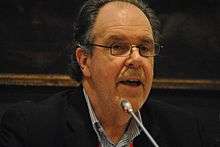John Lloyd (journalist)
John Lloyd (born 15 April 1946)[1] is a journalist, presently contributing editor to the Financial Times and an Associate Fellow of Nuffield College, Oxford.[2]

Background
Lloyd was born and raised in Anstruther, Fife, by his grandparents and mother, a beautician. He was educated at Waid Academy in the town, and after spending a short period working as a caddie in Canada attended the University of Edinburgh, where he graduated with an upper-second class MA (Hons.) degree in English Literature in 1967.[3]
Career
Lloyd initially was employed as a writer for the 'alternative' press, contributing articles to publications such as Ink and the London listings magazine Time Out, where he worked in the news section as the Belfast Correspondent.[3] In 1976 he was hired as a producer for the London Weekend Television current-affairs programme Weekend World, and the following year embarked on a twenty-year career working for the Financial Times: having began as an industrial reporter and labour correspondent (covering, among other things, the Miners' Strike of 1984-5), he later became East European editor and then, from 1991 to 1995, Moscow Correspondent. Lloyd left the Financial Times in 1986 upon being made editor of the New Statesman, but returned there after only one year.[4] He was latterly a columnist for The Times from 1997 to 1998, and returned to the New Statesman as a contributor and associate editor from 1996 to 2003.[5] In 2006, he co-founded the Reuters Institute for the Study of Journalism at the University of Oxford. He is director of the Axess Programme on Journalism and Democracy.
He is a member of the editorial board of Prospect, the advisory board of the Moscow School of Political Studies, and is a columnist for La Repubblica of Rome. He has won awards for journalism, including Specialist Writer of the Year in the British Press Awards and Journalist of the Year in the Granada What the Papers Say Awards.
His books include Loss Without Limit: The British Miners' Strike (with Martin Adeney, 1985); Rebirth of a Nation: An Anatomy of Russia (1998), What the Media Are Doing to Our Politics (2004), Reporting the EU: News, Media and the European Institutions (with Cristina Marconi, 2014), and Should Auld Alliance Be Forgot: The Great Mistake of Scottish Independence (2020).
Political and other views
In the 1970s, Lloyd was a member of the Communist Party of Great Britain and later the British and Irish Communist Organisation. He then became a supporter of the Labour Party.[6] Lloyd also supported the Ulster Unionist leader David Trimble, believing Trimble could help bring peace to Northern Ireland.[7]
In the 1990s, Lloyd was one of several prominent members of Common Voice, a British group that advocated voting reform.[8] A strong supporter of the Blair government, he supported the 2003 invasion of Iraq,[9] as well as the Cameron ministry's 2011 military intervention in Libya.[10] In August 2014, he was one of 200 public figures who were signatories to a letter to The Guardian opposing Scottish independence in the run-up to September's referendum on that issue.[11]
Personal life
He is married with one son, Jacob, from a previous marriage.
References
- "Birthdays", The Guardian, p. 35, 15 April 2014
- Profile: John Lloyd The Guardian website.
- Alumni Profiles: John Lloyd, Edinburgh University Alumni Services. Accessed 20 May 2020.
- "LLOYD, John Nicol Fortune". Who's Who. ukwhoswho.com. 2020 (online ed.). A & C Black, an imprint of Bloomsbury Publishing plc. (subscription or UK public library membership required)
- Wilby, Peter (12 July 2004). "Rough trade". New Statesman. Retrieved 31 August 2019.
- Lloyd, John (7 May 2007). "Tony, the NS and me". New Statesman. Retrieved 31 August 2019.
- Godson, Dean, Himself Alone: David Trimble and the Ordeal of Unionism, Harper Collins, 2004, p.30, 253-4.
- Lloyd, John and others, "Letters", The Guardian, 2 January 1992, p.18. Other signatories to the letter included Gerald Aylmer, Beatrix Campbell, Dick Pountain, Nina Fishman and David Marquand.
- Kampfner, John (12 May 2003). "The British neoconservatives". New Statesman. Retrieved 31 August 2019.
- Lloyd, John (22 April 2015). "Europe's greatest crisis isn't Greece or Ukraine, and it may have no solution". Reuters. Retrieved 22 April 2015.
- "Celebrities' open letter to Scotland – full text and list of signatories". The Guardian. 7 August 2014. Retrieved 26 August 2014.